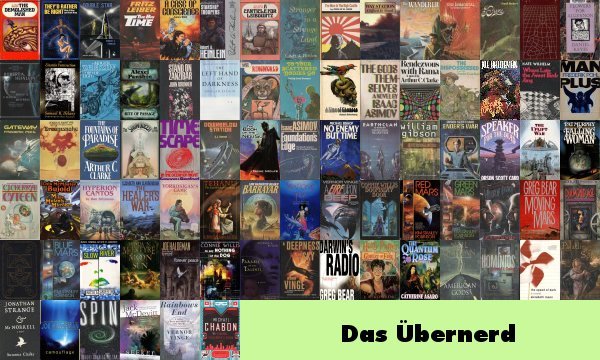 Time marches on and sometimes it marches some of the non-fiction Hugo winners right out of relevancy. These are the first three non-fiction winners and between them one has been supplanted by more efficient resources, one is badly out of date, and one is actually still fairly interesting and useful.
Time marches on and sometimes it marches some of the non-fiction Hugo winners right out of relevancy. These are the first three non-fiction winners and between them one has been supplanted by more efficient resources, one is badly out of date, and one is actually still fairly interesting and useful.The Science Fiction Encyclopedia
by Peter Nicholls
1980 Hugo Winner for Best Related Non-Fiction
Starting with the easiest to review, this volume is the root of other encyclopedias that Nicholls has edited including the already reviewed The Encyclopedia of Fantasy. And just like that later book this one has been completely replaced by online resources. I did find it slightly more helpful than Fantasy mainly due to a comprehensive introduction which let me understand the book better even when I don't agree with some of their comments. Googling is always going to be faster and will typically return a lot more information than looking something up in this encyclopedia will but I've seen worse reference books.
 Cosmos
Cosmosby Carl Sagan
1981 Hugo Winner for Best Related Non-Fiction
Look at that cover, that grouping truly captures the vast majesty of space in a way that will never be surpassed...
Unless...
...Well, never mind then.
And that pretty much sums up what has happened to Cosmos. As a companion to the television series it made a fine overview of science, particularly astronomy, in 1980 but it's now 2008 and these days a book from 2006 would be badly outdated.
With the advancements made in the past ten years it can be hard to remember how exciting the Mariner, Pioneer, and Voyager probes were. I have a NASA publication called Mars Through the Eyes of Mariner 9 that features breathless quotes by people who worked on the project about what it meant to planetary science (including some by Carl Sagan!), but the photographs that accompany it are grainy, low resolution black and white. It's an interesting historical artifact but it's not very good for the science.
The history lessons in Cosmos are fascinating and Sagan makes them very enjoyable. He goes into the how and why of the facts, something that most science books gloss over. Unfortunately this only covers about a third of the book.
That's appropriate since any value for the modern reader in Cosmos is going to come from history. It's one of the first pop-science books, the state of astronomy and planetary science in 1980 is captured well, and the actual history lessons are very good. But I don't think that's enough to recommend it to a modern reader.
 Dance Macabre by Stephen King 1982 Hugo Winner for Best Related Non-Fiction
Dance Macabre by Stephen King 1982 Hugo Winner for Best Related Non-FictionI don't think that a publisher could find someone better than Stephen King to write a book about the horror genre. Besides being the best known author in the field he's made a study of his genre and knows it inside and out. The result is a book about scary stories that may lack a few details on modern writers but doesn't feel lacking.
I wish I had read this right after I read Aldiss's Trillion Year Spree as it stands as a strong counterpoint to everything I disliked in Aldiss's book. Dance Macabre doesn't make a pretense toward being a scholarly work but it conveys just as much information about its broad subjects and in a more interesting tone. King also doesn't try to cover the entire breath of the horror genre. He discusses its rise (from much of the same roots that Aldiss covered) but makes a point of sticking to what he knows best: roughly everything from 1950 to 1980.
I can think of only two major shifts in horror that King doesn't cover due to when the book was written. The first is the rise of the neo-gothics such as Anne Rice. The second is television returning to be a viable medium for telling horror stories. Things like the slasher craze of the 80's or it's descendant the torture porn of recent years aren't directly mentioned in the book but their look-alike parents, the exploitation films of the 1970's, are.
Dance Macabre does a fine job of giving the reader an overview of the horror genre in that thirty year period as well as quite a bit of details on the genre itself. As a result I found it to be an interesting and informative book despite being twenty-five years behind the times.
